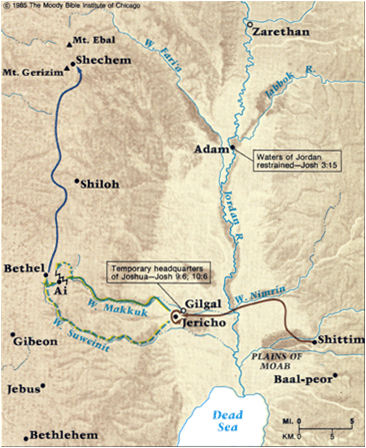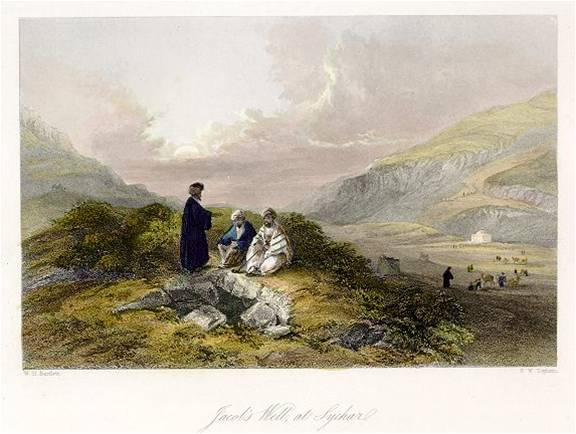Gospel of John [16:28-31]. Implications of the glorification of Christ. Joh 7:37-39; 4:5-26.
Title: Gospel of John [16:28-31]. Implications of the glorification of Christ. Joh 7:37-39; 4:5-26.
Announcements/opening prayer:
The implications of the victory of Christ and His return to the Father in glory are immense since the gifts given at salvation surpass anything ever given to man or angel.
Joh 4:19 The woman said to Him, "Sir, I perceive that You are a prophet [same conclusion as many Jews].
Insight into Samaritan beliefs can give us a better feel for this woman's heart. The Samaritans did not recognize the canon of post-Mosaic prophecy which forms the second division of the Jewish Bible. In their belief, the statement of Deu 34:10 was absolute and final.
Deu 34:10-12
Since then no prophet has risen in Israel like Moses, whom the Lord knew face to face, for all the signs and wonders which the Lord sent him to perform in the land of Egypt against Pharaoh, all his servants, and all his land, and for all the mighty power and for all the great terror which Moses performed in the sight of all Israel. [Yet God didn’t say that there would be no prophets, but that none of them would be like Moses.]
This remained absolute and valid until the rise of the second Moses, the Taheb or great prophet of the new age, to whom they looked forward. Between the first and second Moses no prophet could be expected. If therefore the woman meant the term 'prophet' seriously, she was already on the brink of the great discovery about this stranger's identity at which she was shortly to arrive: a man who could tell her all that she ever did could be no less that the Coming One himself.
As the conversation now turns to the religious, the woman does what most religious people do when confronted with a person of a different persuasion and that is to bring up differences.
As instructed by Moses Joshua built an altar on a mountain next to Shechem. He did this after he conquered Jericho and Ai.
Shechem lies in a valley between two mountains, Ebal to the north and Gerizim to the south.


The Samaritan Bible says the altar was built on Gerizim while the Jewish Bible, which is the standard used in any Church Bible, says the altar was built on Ebal. Naturally, the Samaritans and the Jews accused the other of changing the original text and still do.
Deu 27:4
So it shall be when you cross the Jordan, you shall set up on Mount Ebal, these stones, as I am commanding you today
From this natural amphitheater the curses (from Mt. Ebal) and the blessings (from Mt. Gerizim) of the Law were read to the people as Moses commanded them to do and in this they affirmed their covenant with God in the Promised Land.
Yet these mountains were not designated as permanent places of sacrifice, but a particular place was designated.
Deu 12:5-6
But you shall seek the Lord at the place which the Lord your God shall choose from all your tribes, to establish His name there for His dwelling, and there you shall come. And there you shall bring your burnt offerings, your sacrifices, your tithes, the contribution of your hand, your votive offerings, your freewill offerings, and the first-born of your herd and of your flock.
Since the tabernacle with the ark of the covenant was brought to Shiloh we infer that this was the place that God designated. It was from Shiloh that Samuel administered from the tabernacle and the Lord appeared to him there so that we can safely assume that this is where God wanted His tabernacle.
1Sa 3:21
And the Lord appeared again at Shiloh, because the Lord revealed Himself to Samuel at Shiloh by the word of the Lord.
As we have studied, some time later, the ark was brought from Shiloh into battle with the Philistines by Hophni and Phinehas and it was captured by the Philistines. David later recovered the wayward ark and brought it to Jerusalem where he built another tent or tabernacle to house it. David desired to build a permanent house for the ark, or a temple, for which God was pleased, but was unable to begin the project before his death. His son Solomon built the temple and completed it. It cannot be doubted that this temple and its location pleased the Lord since the glory of the Lord filled the temple in the sight of all Israel.
1Ki 8:10-11
And it came about when the priests came from the holy place, that the cloud filled the house of the Lord, so that the priests could not stand to minister because of the cloud, for the glory of the Lord filled the house of the Lord.
After the destruction of Solomon's temple by the Babylonians the subsequent captivity and the return 70 years later, the Samaritans offered to help the returning Judeans to rebuild the temple. The Jews rejected this offer, thinking Samaritan blood to be tainted by intermarriage after their own captivity by the Assyrians 130 years prior and so not worthy of participation. This began the escalation of the hatred of one to the other.
The Samaritan woman brings this up.
Joh 4:20 "Our fathers worshiped in this mountain [Gerizim], and you people say that in Jerusalem is the place where men ought to worship."
She is likely expecting a theological debate over which is the place of worship, but she received an answer that was quite different. The time when there was any point in the argument about the claims of Gerizim versus those of Zion had come to an end. Christ brought something that rendered such questions out-of-date and meaningless. The question wasn't where but how and who. As we have been noting, Jesus ceaselessly spoke of the Father, from whom He came and to whom He was returning. Worship would be directed toward the Father and the Son through the agency of the Holy Spirit, no matter where a believer found himself on planet earth.
Joh 4:21 Jesus said to her, "Woman, believe Me, an hour is coming when neither in this mountain, nor in Jerusalem, shall you worship the Father.
Joh 4:22 "You worship that which you do not know; we worship that which we know, for salvation is from the Jews [Messiah from Judah].
Samaritans rejected the prophecy that the Messiah would come through Judah since they only accepted the Torah, and they explained away Jacob's prophecy in Gen 49:10 that the scepter shall not depart from Judah.
Joh 4:23 "But an hour is coming, and now is, when the true worshipers shall worship the Father in spirit and truth; for such people the Father seeks to be His worshipers.
The change from the Law to grace, meaning all the gifts that would come by means of Christ, would incur a drastic change in the relationship of believing man to God the Father.
Presented is the simple fact that men will be made sons of God and as such will worship the Father in Spirit/spirit and truth. Yet this simplicity has been distorted by falsehoods in people's hearts that is much the same as this woman's. People who believe worship is only in a certain building or with a certain group of people or that it is more intense on certain days or in certain seasons. We do worship the Father in the local church building and we celebrate the Lord's Supper together there as well as sing as a group unto Him, but that does not mean that our worship of God the Father and His Son ends at the door of the building. We are in full time Christian service, 7 days a week, and we honor and adore the Father by submitting to His will in every area of our lives from a divine viewpoint of thinking in the heart.
People like rituals because they can get them over with. People don't like relationships where the laying down of certain things (sacrifice) is necessary for its intimacy.
A proper intimacy in a proper relationship takes sacrifice and virtue. A good husband and a good wife demands sacrifice and virtue from both. The same is true in friendship, in work relationships, in parenting. People have been fooled into thinking that a proper intimacy can arise without these and it is a proper lie.
Rom 8:15-17
For you have not received a spirit of slavery leading to fear again, but you have received a spirit of adoption as sons by which we cry out, "Abba! Father!" The Spirit Himself bears witness with our spirit that we are children of God and if children, heirs also, heirs of God and fellow heirs with Christ, if indeed we suffer with Him in order that we may also be glorified with Him.
Could a believer be fully intimate with Christ if he never understood and experienced Christ's sufferings? How could a believer say he knows Christ fully when he has never experienced this huge part of Christ's life?
Gal 4:6-7
And because you are sons, God has sent forth the Spirit of His Son into our hearts, crying, "Abba! Father!" Therefore you are no longer a slave, but a son; and if a son, then an heir through God.
Could a believer be fully intimate with Christ if he never understood and experienced the inheritance of Christ? How could a believer say he knows Christ fully when he has never experienced this huge part of Christ's life?